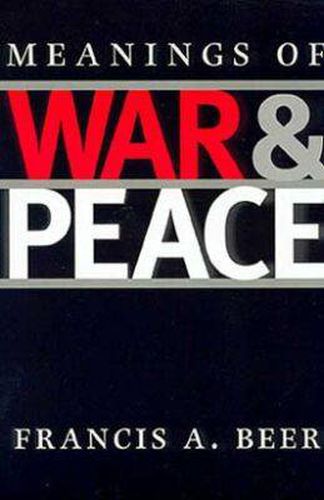Readings Newsletter
Become a Readings Member to make your shopping experience even easier.
Sign in or sign up for free!
You’re not far away from qualifying for FREE standard shipping within Australia
You’ve qualified for FREE standard shipping within Australia
The cart is loading…






In this volume, Francis A. Beer (joined by colleagues as co-authors of some chapters) examines the cognitive, behavioural and linguistic dimensions of war and peace. Language, he shows, is important because it mediates between thought and action. It expresses beliefs about war and peace and affects the perceptions of potential adversaries about one’s own intentions. Beer examines how language transmits and creates meaning though interaction with specific audiences. His case studies include the Somalian intervention, Sarajevo and the Balkan conflict, and the Gulf War. Moving beyond the discrete words of war, the text takes a broader view of how political participants interact in war and peace through continuous streams of communication that reflect and construct worlds of meaning. The volume brings together insights and evidence from political science, cognitive psychology, linguistics, history and rhetorical studies, and applies them in a focused way to the problem of war and peace.
$9.00 standard shipping within Australia
FREE standard shipping within Australia for orders over $100.00
Express & International shipping calculated at checkout
In this volume, Francis A. Beer (joined by colleagues as co-authors of some chapters) examines the cognitive, behavioural and linguistic dimensions of war and peace. Language, he shows, is important because it mediates between thought and action. It expresses beliefs about war and peace and affects the perceptions of potential adversaries about one’s own intentions. Beer examines how language transmits and creates meaning though interaction with specific audiences. His case studies include the Somalian intervention, Sarajevo and the Balkan conflict, and the Gulf War. Moving beyond the discrete words of war, the text takes a broader view of how political participants interact in war and peace through continuous streams of communication that reflect and construct worlds of meaning. The volume brings together insights and evidence from political science, cognitive psychology, linguistics, history and rhetorical studies, and applies them in a focused way to the problem of war and peace.